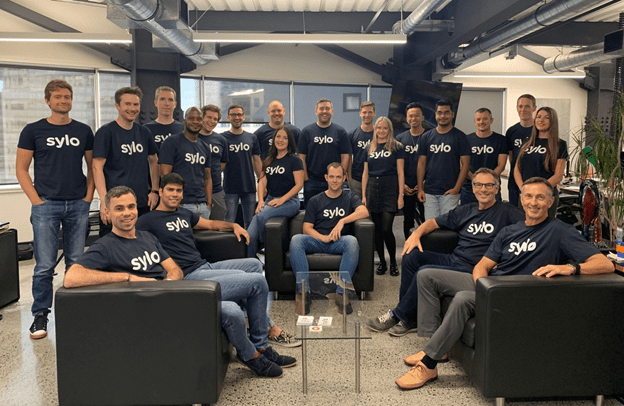Dorian Johannink is a Co-founder/Business Director at Sylo, a decentralised platform focused on secure communication and social FinTech. Dorian will be sharing more details with us about Sylo in this interview.
Please tell us about yourself.
I was formally trained in business and management but immediately after completing university, quickly found myself so intrigued by the digital landscape that I started my first company; a digital consultancy focused on supporting small businesses to leverage social platforms to build their brands, customer bases and sales.
Through this work, I developed a unique understanding of how these platforms operated and just how much data they were collecting, extracting and leveraging from everyday users.
I came to a pretty quick realization that there must be a better to provide services to users than treating them merely as products. That was where my drive to launch Sylo began.
What is Sylo?
Sylo is a decentralized communication platform. Its primary goal is to provide many of the major features and functionalities we get from mainstream communications platforms, except without the data-centric model.
Using distributed technologies to connect users, without invasively collecting and harvesting their information and communications data, Sylo puts users back in the driver’s seat, regarding their digital identity and communications data.
Essentially, Sylo lets users do what they do online, but without being exploited. We view it as a bit of a ‘re-invention’ of the internet model.
Technology has now moved past the point where it’s amazing to connect with someone on the other side of the world.
Now as we move into web 3.0, the focus is on how these services are being delivered and people are starting to wake up to the fact that it matters which service (and therefore which method of delivery) you choose.
The goal of Sylo is to offer an online communication experience as close as one can get to an in-person, private conversation.
What problems are you solving with Sylo?
Sylo tackles a range of problems facing us today; first of which, is the user data privacy issue.
Sylo provides the benefits of digital communication, without the negatives associated with centralized data-centric models, thereby putting users back in control of their digital identity.
By using a distributed architecture model, users don’t have to trust that we won’t look at their data, as we simply do not collect and retain it – we couldn’t look at it even if we wanted to.
On Sylo, a user chooses exactly what information they want to provide to the platform and to other users or businesses they interact with, as opposed to having all their data extracted by default.
Putting users back in control of their choices like this helps to form the foundation of equitable relationships between service providers, businesses and users. Relationships where value is provided both ways, not in the one-sided sense you currently see so prevalently, with users being exploited whilst service providers reap all the benefits.
We see this new way of interacting as beneficial to both sides of the equation in the long-term, as it creates a more sustainable value exchange based relationship between users and platforms.
Another key piece that comes with user identity control is ‘portability’.
This means that users can opt in to share their personal data set and information (either all or pieces of) with whatever services they choose, across multiple platforms and service providers, and then later revoke that access if desired. This relieves the user pain-point of having to create a new account for every new service you want to use and having your information persist on that platform indefinitely.
The second problem that Sylo solves is that of how to introduce the innovation, benefits and advantages of blockchain, digital and crypto-assets to the mainstream.
Sylo incorporates the use of digital assets into a straightforward user experience that you could stack next to any popular messenger. The app offers aspects usually deemed complicated and makes them easy – such as sending currencies within a chat message or creating your own assets (for fun or for commerce).
Digital assets might be piece of tech that’s only just emerging into mainstream awareness, but their popularity’s sure to rise once their potential usability is recognized. For example, Sylo provides a means for companies to engage with digital assets in a context where a much larger segment of their customer bases will be able to participate; as opposed to the very niche-focused solutions available elsewhere that generally only cater to the tech-savvy.
Lastly, the Sylo solves problems for developers and companies looking to build communication solutions. The Sylo Protocol SDK enables these projects to quickly build solutions using our architecture – one that respects users and offers decentralized end-to-end encrypted communications (with features such as messaging, calling and data storage).
What are the major features and services provided by Sylo?
For an end user, the Sylo DApp (decentralized application) offers completely private and confidential core communication features. Messaging, video and audio calling, media and file sharing, all with the addition of blockchain integration, enables users to interact, exchange and pay using digital assets or cryptocurrencies.
For a developer, the Sylo Protocol SDK offers the tools to build secure and distributed methods of communication and storage functions into apps.

What is the technology behind Sylo?
We often get asked, ‘Why would you use blockchain for communications – isn’t it slow and not very appropriate for storing large amounts of data?’
The answer is – Yes, that’s correct and that’s why we only use blockchain where it makes sense.
To deliver our solution, Sylo uses a combination of the latest technologies, including peer-to-peer, E2EE, IPFS, blockchain, and more.
What is the level of demand for Sylo services and who are your focus users?
We launched our first version solution of the Sylo app two years ago and it’s now used across more than 24 countries. This solution was positioned primarily at professional industries where they have a mandate for confidentiality and quickly gained adoption across a number of fields including mental health, legal, financial advisory, accounting, and medical.
We saw greatest adoption across independent professional and small practice levels, due the ease of a ‘plug and play’ solution that can be used on any major platform device (computer or smartphone). Sylo was a welcomed solution for use cases like these and saved businesses having to invest significant resource into setting up external secure, managed communication services.
Since releasing our first solution, we have spent the last couple of years building our fully decentralized, blockchain-enabled platform, which is focused on enabling easy interaction with digital assets and increasing the user scope to include consumer-level users.
This was on the back of seeing a significant increase in awareness and demand for privacy-oriented communication services, following the plethora of revelations around mass data breaches and data misuse over the last few years. The sins of centralized big tech continue to snowball, moving users towards fuller awareness of their digital identity and the importance of carefully choosing which communication services they use.
At what level of development is Sylo, do you have any opportunities for investors and partners?
As mentioned above, we have an existing product in market (Sylo Confidential) being used globally, and we released our new, blockchain-enabled platform (Sylo DApp) in Beta recently, in Q2 of 2019. You can access this version directly via our website.
By the end of the year we will be moving the Sylo DApp to gold release and merging our products, so that we will have just the one, unified, completely decentralized communication DApp, offering all the benefits we can summon for our users in one app and experience.
Could you tell us about your team and customer support?
We’ve managed to attract a truly talented, really diverse team with expertise across peer-to-peer technologies, consumer driven UX/UI, blockchain, design, digital marketing, finance, and more. We didn’t realize quite how diverse our team was until we recently held a ‘pot luck’ lunch, with all staff bringing a dish from their home country.
It turns out that in a team of 22, we have more than a dozen different nationalities, spanning New Zealand, Ireland, Scotland, Ukraine, India, Russia, Philippines, Namibia, Germany, China, and England; all based in our office HQ in Auckland, New Zealand.

How safe is Sylo — would you like to talk about your legal and security measures?
In a nutshell, Sylo is as private and confidential as you can get on an online open access platform.
We use completely distributed architecture, meaning the content of your communications are never stored on a third party ‘middleman’ centralized server. It’s only you and the person you are communicating with that have a record of your communications.
In addition to this architecture, we apply top grade, end-to-end encryption (E2EE) to everything.
Many communication platforms now incorporate E2EE to their services, such as Whatsapp, Telegram, etc., but they still operate on a centralized infrastructure. This leaves a single point of attack and vulnerability, and required users to trust that the platform itself will not change policy at some stage down the line and access all their information.
Decentralization creates privacy and security by removing the central pot of data gold, as opposed to just adding additional layers of security onto a digital vault of data.
It also removes the requirement that a user trust that the service provider will not peek into their data – a decentralized service simply does not capture or store data, eliminating the issue altogether.
Once you get your head around the difference in modelling between centralized and decentralized architectures, you start to see how it really is much more appropriate way of enabling communication from a number of standpoints, whether it be for private, individual communications, confidential business communications, or for governmental communications requirements.
Up until now, fully decentralized communication hasn’t really been a viable option, due to the difficulty in delivering a ‘usable’ experience on distributed architecture.
At Sylo we are one of the first wave of platforms (and proud of it!) that have managed to deliver a decentralized experience that mainstream users would actually consider migrating to, from a mainstream centralized communication platform.
Don’t get us wrong though – it hasn’t been easy. This most recent release has been half a decade in the making…
Do you have more information for our readers?
A core objective of our team is to introduce the benefits of decentralization to the mainstream. We believe education and awareness is essential moving forward, so that we have informed users, who know what they are voting for when they choose to adopt a new digital service like ours.
As such, we are constantly producing a range of resources available via our website and YouTube channel, focused on breaking down elements of what we do, and the reasons why we do it. Awareness and understanding of this space is key to forging a better web 3.0, for everyone!

































